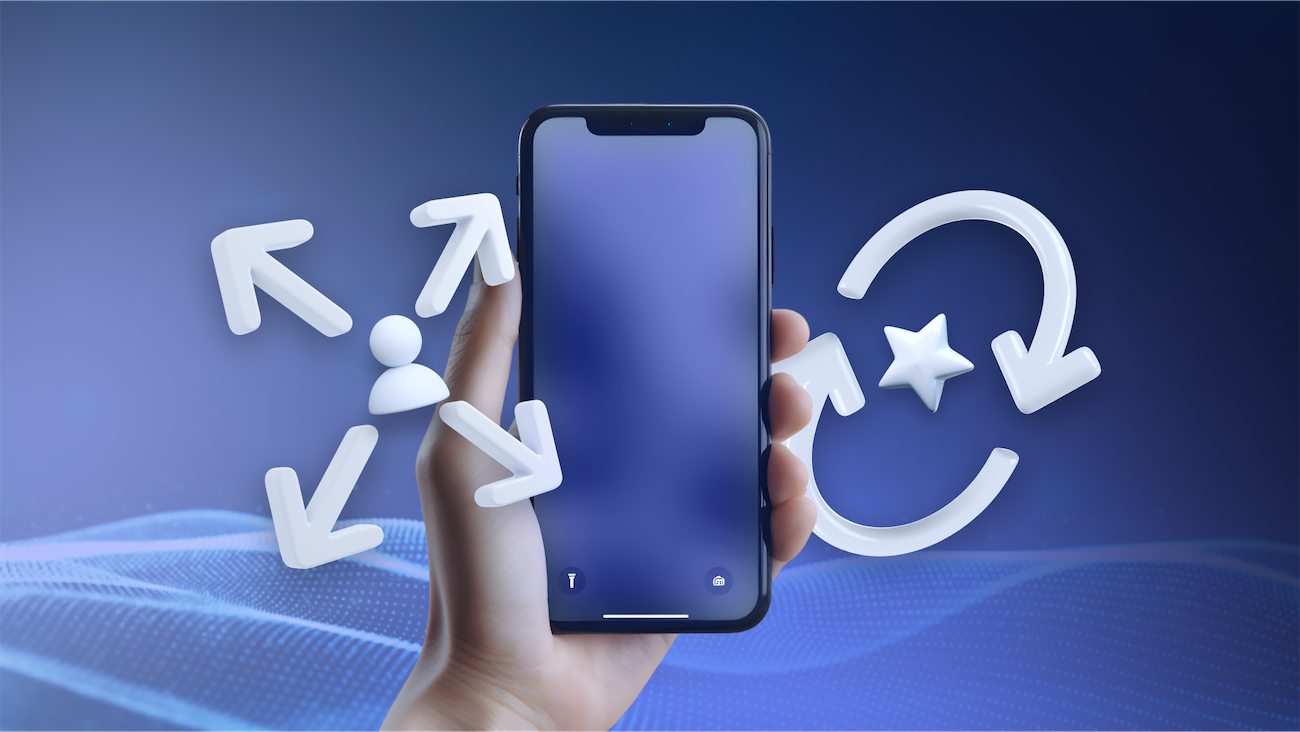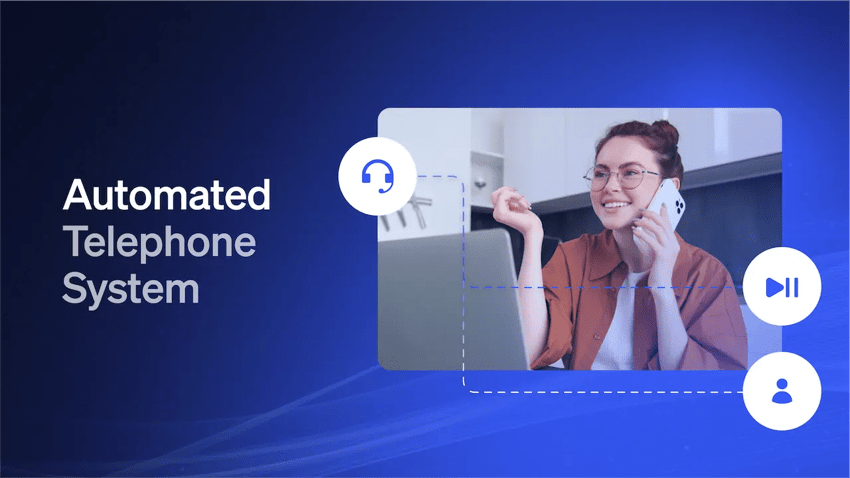Contact centers have evolved from traditional call centers to vibrant customer engagement hubs.
As businesses aim to meet customers’ needs across the customer journey, the transition to multichannel omnichannel has become quite popular. However, it takes much more than a CRM and a call center solution to achieve a successful customer service experience.
79% of customers expect consistent interactions across departments. 55% say they feel like they’re communicating with separate departments rather than one company, leading to disjointed customer experiences.
But how do you know which strategy — omnichannel or multichannel — will address the communication gaps and meet your needs?
In this guide, we’ll explore the differences between multichannel and omnichannel contact centers, their advantages, and how to choose the right customer service strategy for your business.

What Is an Omnichannel Contact Center?
An omnichannel contact center integrates multiple communication channels in one platform. It empowers businesses to deliver a consistent, personalized experience across all touchpoints, no matter how customers choose to interact.
Customer support teams gain a better view of each customer’s history and preferences, enabling them to deliver proactive and tailored service. It ensures a unified customer experience across all channels and also drives better agent productivity.
Omnichannel contact center advantages
- Unified experience: A single platform streamlines customer interactions across all channels, eliminating fragmentation and confusion.
- Complete customer data: Agents fully understand each customer’s history and touchpoints, fostering personalized and proactive engagement.
- Adaptability to emerging channels: Cloud architecture enables quick integration of new channels like social media, SMS, and in-app messaging, ensuring you’re where your customers are.
- Hyper-personalization: Use customer data to tailor interactions and anticipate needs, creating a truly personalized journey.
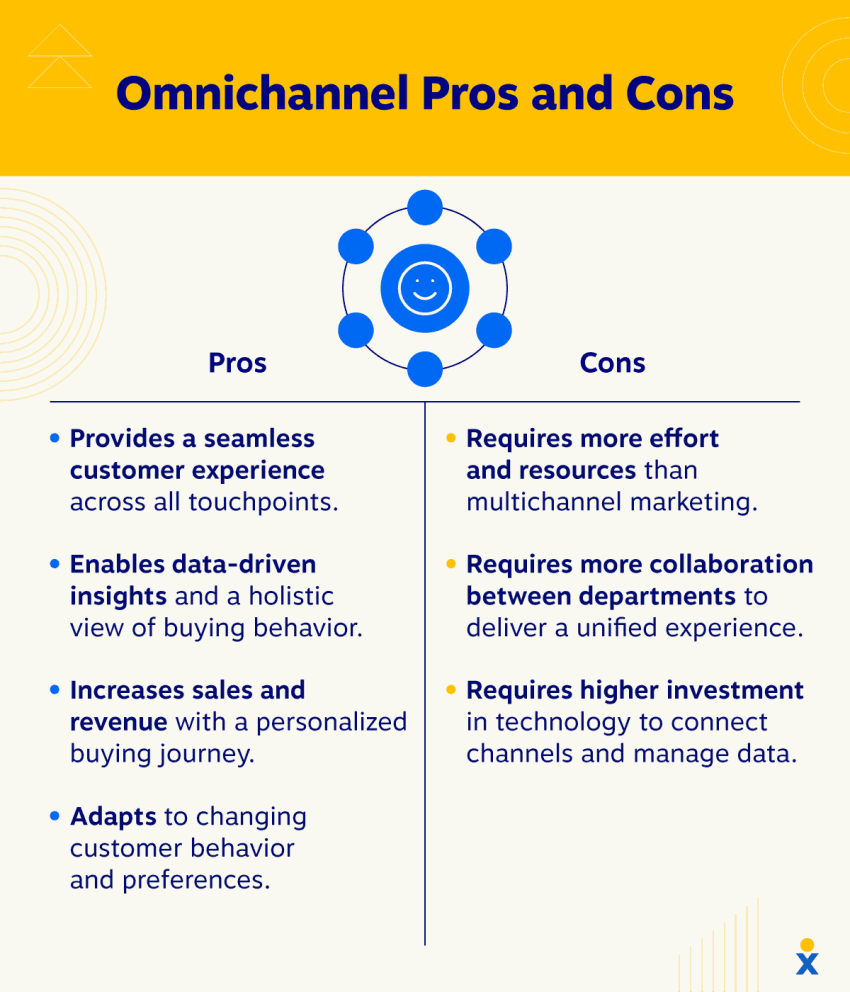
An omnichannel cloud contact center ensures that customers get a consistent experience regardless of how they access your website or visit your physical store.
Customers may use social media to contact your contact center agent and have their messages appear on their screen without losing any important information.
The omnichannel strategy works for larger contact centers like Disney’s. Customers can easily plan vacations across their website, mobile app, and call center. Agents have access to customer preferences and past interactions, offering a hyper-personalized experience.
👉 If this sounds great, we recommend the Nextiva Contact Center!
What Is a Multichannel Contact Center?
A multichannel contact center is a customer service hub that allows businesses to interact with their customers through various communication channels, such as phone calls, emails, live chat, social media, SMS, and more.
It goes beyond the traditional call center model by integrating these different channels into a single platform, enabling agents to manage customer interactions efficiently via their preferred channel.
Multichannel contact centers usually operate communication channels independently. While offering flexibility, it may lead to a less cohesive customer experience as agents lack access to cross-channel interaction history.
Multichannel support centers do automate multiple channels of communication. However, unlike omnichannel centers that are integrated, the communications in multichannel centers are not interconnected. This means that agents may be unaware of someone’s previous interactions through other channels.
Multichannel contact center advantages
- Siloed channels: Phone, email, chat, and other channels operate in silos rather than as integrated systems.
- Limited customer data: Agents only have access to customer history within that specific channel, narrowing their focus on the channel itself.
- Channel-specific metrics: Key metrics like response time are measured for each channel separately.
- Quick setup: Faster and simpler initial configuration compared to complex omnichannel deployments.
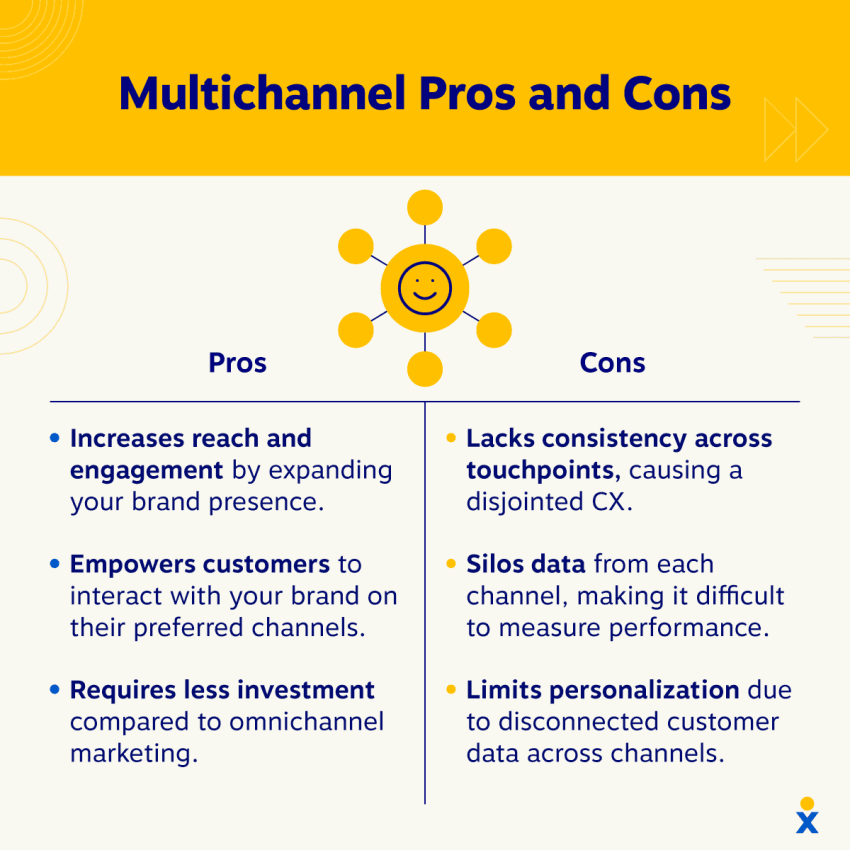
Multichannel communication is best if the customer experience doesn’t span multiple contact methods. As such, it’s a cost-effective option for a company to establish its initial contact center.
For example, a local retail store with a limited online presence may find a multichannel approach suitable. They can offer phone and email support, along with in-store assistance, catering to their customer base without needing complex integrations.
👉 If this sounds attractive, we recommend the Unity Contact Center offered by Nextiva.
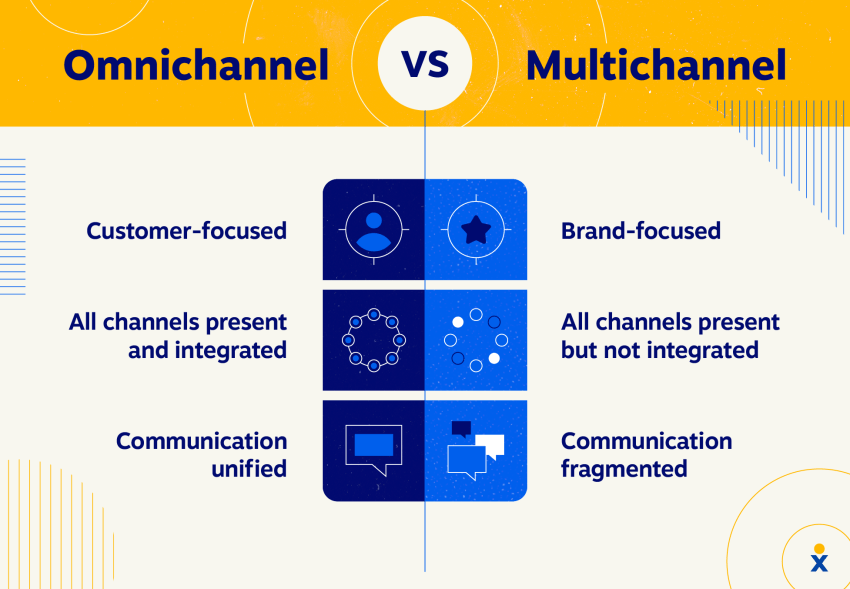
Differences Between Omnichannel & Multichannel Contact Center
The clearest contrast between omnichannel and multichannel is the customer experience.
Omnichannel creates a fluid, personalized journey where customers feel recognized and understood, regardless of the channel they use. Multichannel, while still valuable, may lead to disjointed experiences due to the lack of cross-channel integration.
Here’s a closer look at the key differences between omnichannel vs. multichannel contact centers.
| Feature | Omnichannel | Multichannel |
|---|---|---|
| Integration | Fully integrated systems across all channels | Silos between different channels |
| Context | Complete customer history and journey data across channels | Limited cross-channel customer data |
| Experience | Consistent experience across channels | Can feel disjointed across channels |
| Customer Focus | Customer-obsessed, focused on service excellence | More operational focus on delivering service |
| Personalization | Hyper-personalized service based on customer data/journey | Less capacity for personalization |
| Channels | Phone, email, chat, SMS, social media, etc. | Typically focuses on traditional channels |
| Technology | Sophisticated, cloud-based, real-time omnichannel routing | Basic call routing, legacy on-premise systems |
| Cost | Higher investment but drives long-term value | Lower upfront costs but less futureproof |
| Metrics | 360-degree customer relationship metrics | Channel-specific metrics only |
| Best For | Customer-centric teams focused on superior CX | Budget-conscious teams with volume focus |
Nextiva offers both multichannel and omnichannel contact centers. To explore the two CCaaS platforms and the full comparison, check out our comparison of Five9 vs Unity Contact Center.
Nextiva Contact Center vs. Unity Contact Center: Comparison
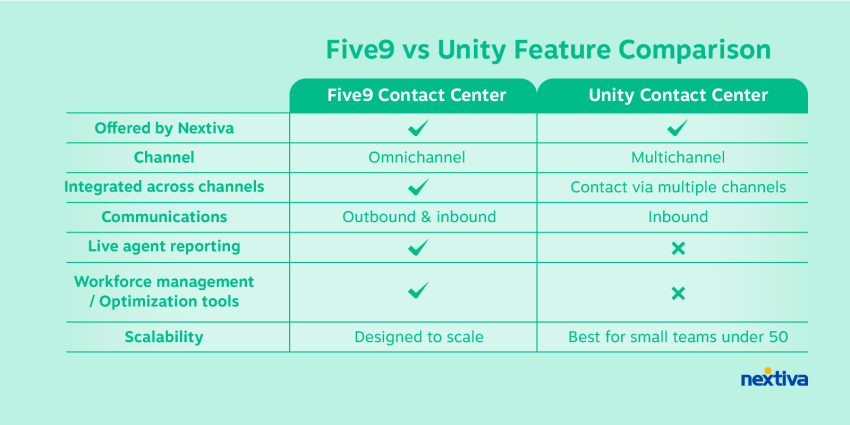
The choice between omnichannel and multichannel contact centers depends on your business goals and resources.
Bottom line: Omnichannel offers superior customer experience but demands greater investment in technology, training, and ongoing optimization. Multichannel offers a cost-effective starting point, especially for businesses with a limited online presence or a focus on specific channels.
Many businesses find a hybrid approach successful, blending elements of multichannel and omnichannel contact centers. You can use the strengths of each approach while tailoring your customer service strategy to your needs and resources.
Why Businesses Choose Contact Centers
A contact center manages and handles customer interactions efficiently. It allows businesses to centralize their customer communication and provide a single point of contact for various channels such as phone calls, emails, live chats, and social media platforms.
Businesses use contact centers for several reasons:
- Better customer engagement: Both multichannel and omnichannel contact centers help businesses interact with customers through their preferred communication channels, phone, email, chat, social media, or mobile apps. Flexibility meets diverse customer preferences and improves accessibility.
- Improved customer experience: Multichannel contact centers provide customers with multiple options for reaching out, improving first-call resolution (FCR) and customer satisfaction. Omnichannel unifies customer experience across all channels, leading to higher customer loyalty and lifetime value.
- Efficient resource allocation: Specialized teams can handle different channels, optimizing channel-specific skills. Omnichannel contact centers also enable dynamic workload distribution across channels, maximizing agent utilization and reducing wait times.
- Enhanced scalability: You can easily scale individual channels based on demand and shift resources across channels during peak periods, ensuring consistent service levels.
- Advanced analytics and insights: Get channel-specific performance metrics and key performance indicators (KPIs) for targeted improvements and a complete view of the customer journey, enabling data-driven decisions for CX enhancement.
- Cost savings: A multichannel contact center is cost-effective initially, allowing businesses to focus on high-impact channels. Omnichannel, while requiring higher upfront investment, often leads to long-term cost savings through improved efficiency and customer retention.
- Upgraded customer service: Contact centers offer a flexible framework that can easily integrate new technologies and channels as they emerge.

Implementation Challenges With Contact Centers
While both omnichannel and multichannel contact centers offer significant benefits, businesses should be prepared to encounter challenges during implementation:
1. Technical integration
Achieving a smooth omnichannel customer service demands robust integration of systems like CRM, contact center software, social media platforms, and more. This can be technically complex and require significant investment in IT infrastructure.
Although multichannel is less intricate than omnichannel, integrating multiple channels even in silos can pose challenges. Ensuring consistent data flow and maintaining compatibility between different systems require careful planning.
2. Data management
Consolidating customer data from diverse sources, such as purchase history, website interactions, and social media engagement, can be daunting. Ensuring data accuracy, consistency, and compliance with privacy regulations necessitates robust data management practices with omnichannel call centers.
A unified contact center solution does make the work easy.
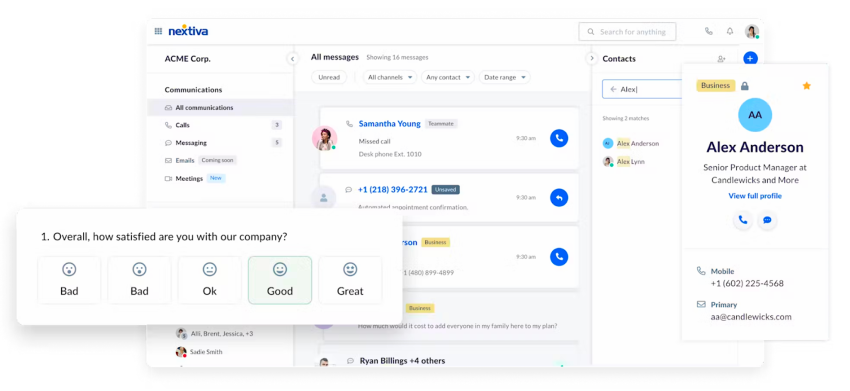
While a multichannel contact center deals with less data integration, maintaining clean and up-to-date customer information within each channel is crucial for effective multichannel support. You need advanced call analytics and dashboards to get a unified customer view.
3. Staff training
With an omnichannel contact center, agents need to be well-versed in navigating multiple digital channels and systems, understanding customer journeys, and delivering personalized service. This calls for better training programs and ongoing development to equip them with the necessary skills.
With multichannel call centers, though channel-specific training is still essential, the complexity is lower compared to omnichannel. Agents need to be proficient in handling customer interactions within their assigned channel.
4. Organizational alignment
Shifting to a customer-centric, omnichannel approach may encounter resistance from departments accustomed to traditional workflows. Bringing collaboration, breaking down silos, and ensuring a shared vision across the organization is vital for successful implementation.
While less disruptive than omnichannel, multichannel implementation may still require adjustments in processes and workflows to ensure smooth coordination across different channels.
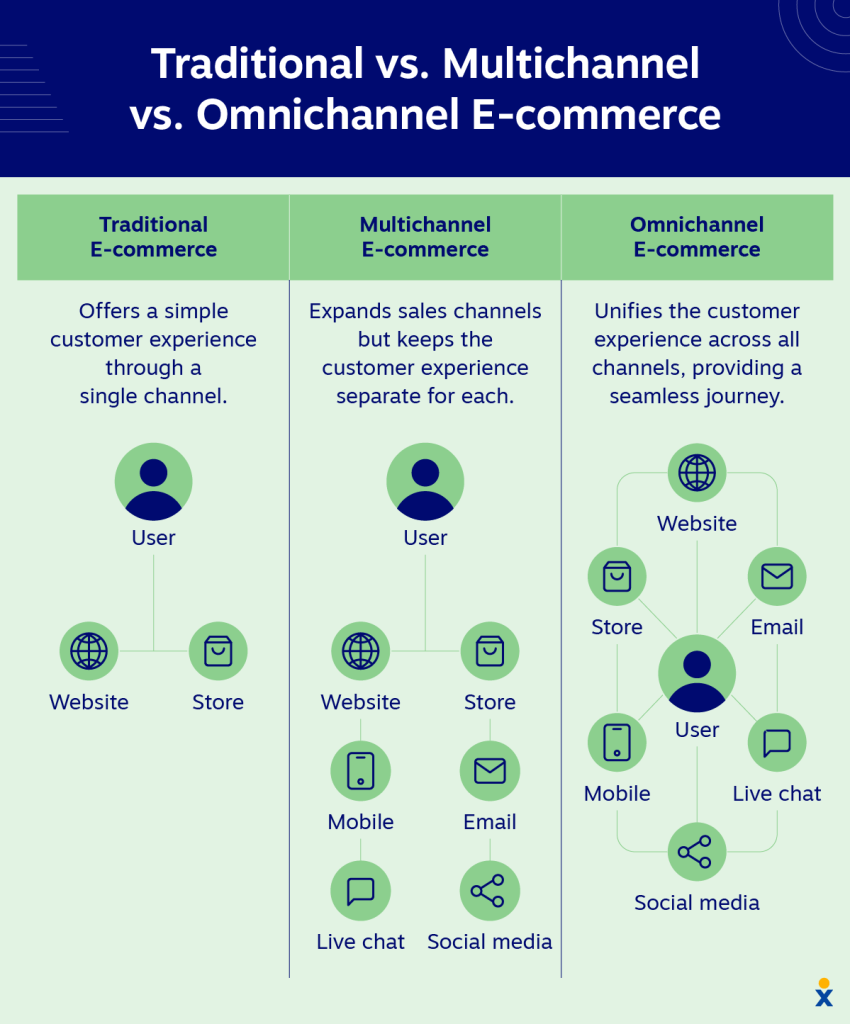
5. Cost management
The initial investment in omnichannel technology, integration, training, and ongoing maintenance can be significant. Businesses need to carefully weigh these costs against the expected benefits and long-term return on investment.
Although less expensive upfront, multichannel might incur hidden costs due to inefficiencies and missed opportunities arising from a lack of cross-channel integration.
6. Regulatory compliance
Businesses must consider regulatory compliance when implementing contact center strategies:
Data protection laws like GDPR, CCPA, and other privacy regulations affect data handling across channels. Industry-specific regulations like Healthcare (HIPAA) and Finance (PCI-DSS) may impact channel usage.
Moreover, legal requirements for storing customer communications vary by channel, so you need to make sure to know the compliances needed and comply with relevant regulatory data privacy laws to secure customer data.
Choosing Your Contact Center Strategy
If you’re at a crossroads, trying to figure out whether to go multichannel or omnichannel for your contact center, here are some key factors to help you decide:
- Business size and complexity: Are you a small startup or a growing enterprise? Smaller businesses might find a multichannel approach more manageable, while larger organizations could benefit from the integrated omnichannel experience.
- Customer base and preferences: What makes your customers tick? If they’re hopping between channels, omnichannel might be your best bet. But if they’re more traditional, sticking to one or two channels, multichannel strategy could do the trick.
- Industry requirements: Some industries have more red tape than others. Healthcare or finance? You might need the robust data management of an omnichannel system to stay compliant.
- Current technology infrastructure: What’s your current tech setup like? If you’re working with a patchwork of legacy systems, a multichannel approach is easier to implement. But if you’re ready for a tech overhaul, go omnichannel with an advanced contact center solution.
- Budget constraints: Multichannel is usually lighter on the wallet upfront, while omnichannel is more of an investment. Think of it as the difference between buying separate kitchen appliances or a high-end multifunction cooker.
- Long-term growth plans: Where do you see your business in 5 years? 10 years? If you’re expanding rapidly, an omnichannel contact center might scale better with your business.
- Desired CX Outcomes: What’s your customer service goal? If you’re aiming for personalized, seamless customer experiences that’ll make your customers go “Wow!”, omnichannel is your ticket. But if you’re focusing on nailing specific channels well, multichannel is the way to go.
Which is best: omnichannel or multichannel?
Both multichannel and omnichannel contact centers offer unique advantages. The right choice depends on your business needs, customer preferences, and long-term goals.
If you want to provide a unified and personalized customer experience from one ecosystem, choose an omnichannel solution.
However, if your main goal is to have focused interactions on a single channel at a time, a multi-channel contact center can still be highly effective.
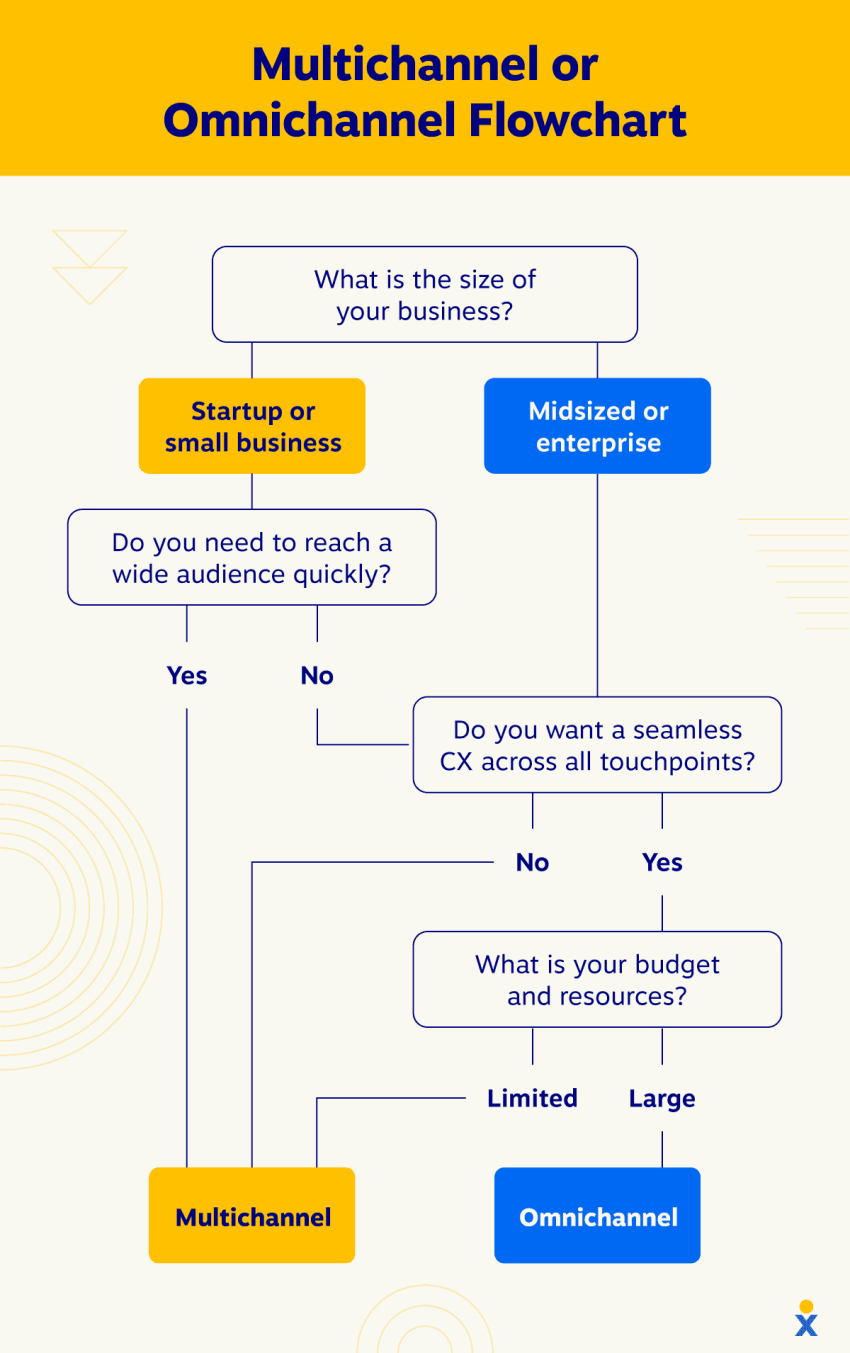
There’s no one-size-fits-all answer. It’s about finding the right fit for your business. Take these factors, think about them, and write down some pros and cons. Start with a multichannel strategy and evolve to omnichannel if that feels right.
The goal is for your customers to be happy and your business to grow, no matter what type you choose.
How Nextiva’s Flexible Contact Center Solutions Help
Nextiva offers versatile contact center solutions, catering to diverse business needs with both multichannel and omnichannel capabilities.
Our offerings range from the cost-effective Unity Contact Center for startups to the comprehensive Nextiva Contact Center powered by Five9 for enterprises seeking seamless, personalized customer experiences.
Key features include:
- Intelligent and skills-based call routing
- Customer journey orchestration across multiple touchpoints
- AI-powered chatbots, self-service, IVR, and virtual assistants
- Scalability to accommodate business growth
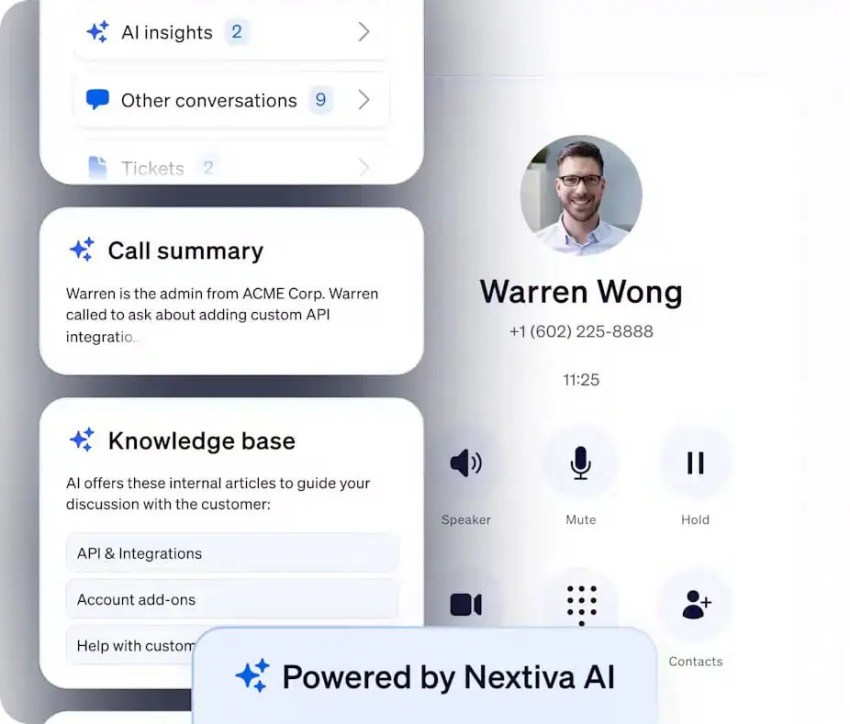
Get your contact center strategy in motion by talking to a Nextiva expert today!
Kickstart your contact center strategy.
Talk to a CCaaS expert today to transform your CX strategy.

















 Business Communication
Business Communication 

